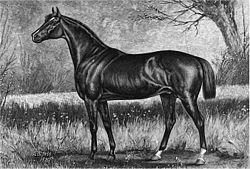| Leonatus | |
|---|---|
 1886 engraving by Henry H. Cross | |
| Sire | Longfellow |
| Grandsire | Leamington |
| Dam | Semper Felix |
| Damsire | Phaeton |
| Sex | Stallion |
| Foaled | 1880 |
| Country | USA |
| Colour | Bay |
| Breeder | John Henry Miller |
| Owner | Jack P. Chinn & George W. Morgan |
| Trainer | Raleigh Colston Sr. John McGinty |
| Record | 11 Starts: 10–1-0 |
| Earnings | $21,435 |
| Major wins | |
| Illinois Derby (1883) Hindoo Stakes (1883) Blue Ribbon Stakes (1883) Tobacco Stakes (1883) Woodburn Stakes (1883) Ripple Stakes (1883) Himyar Stakes (1883) Dearborn Stakes (1883) Green Stakes (1883) American Classics wins: Kentucky Derby (1883) | |
| Awards | |
| American Champion Three-Year-Old Colt (1883) | |
| Last updated on October 16, 2019 | |
Leonatus (foaled in 1880 in Kentucky, died 1898 in Kentucky) was an American Thoroughbred racehorse who won the 1883 Kentucky Derby.